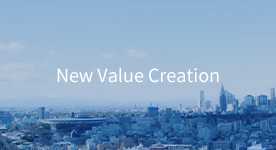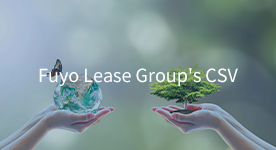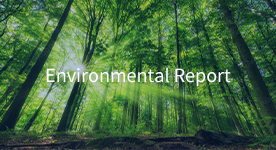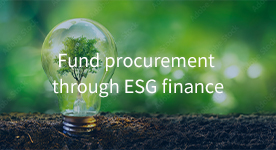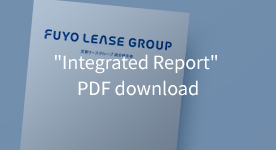Collaborating to save resources and reduce waste
FGL Circular Network and FGL LeaseUp Business Service are involved in processing the leased properties of Fuyo Lease whose lease agreements are up. FGL Circular Network reuses and recycles properties at the end of their leases when they still have value and otherwise recycles and appropriately processes them as waste products. FGL LeaseUp Business Service conducts administration for the continued use of properties for which re-leasing is possible. In this way, the two companies work collectively in “contributing to the development of a circular society,” a goal stated in the Environmental Policy of the Fuyo Lease Group.
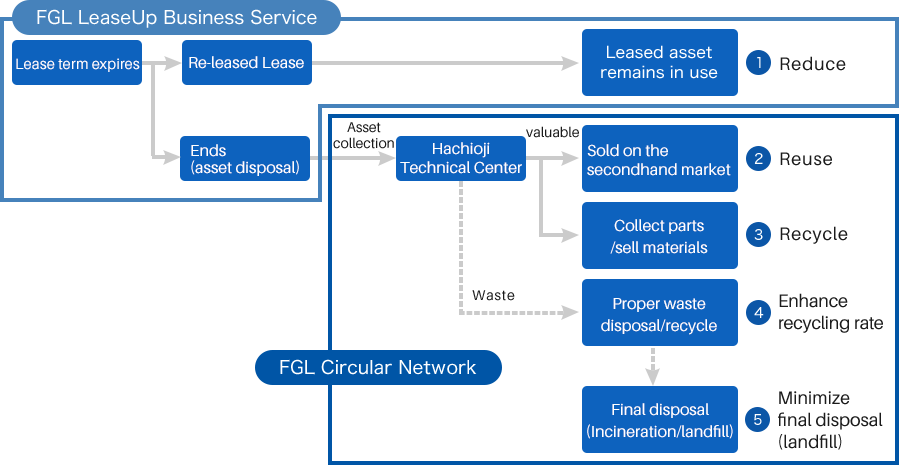
Outline of FGL Circular Network
Profile
FGL Circular Network purchases and sells properties of Fuyo Lease whose leases are up and used properties owned by customers, thereby helping to establish resource circularity.
Company profile
| Established | April 1996 |
|---|---|
| Capital | 10 million yen |
| Shareholders | Fuyo General Lease (100%) |
| Business Activities | Buying and selling of machinery and equipment, installment sales and import / export, and buying and selling of used goods |
Outline of FGL LeaseUp Business Service
Profile
FGL LeaseUp Business Service conducts administrative processing on a contract basis for the leased properties of Fuyo Lease when their leases are up.
Company profile
| Established | April 2022 |
|---|---|
| Shareholders | Fuyo General Lease (100%) |
| Business Activities | Processing of properties with expired leases |
Contributing to a circular society by promoting the reuse of used PCs
The Hachioji Technical Center of FGL Circular Network takes in several thousand computers each month for reuse, computers previously used in the PC Rental, PC Eco & Value Lease, and PC-LCM (lifecycle management) services provided by Fuyo Lease.
Computers transferred to another party for reuse are first subject to appropriate processing that includes destroying all data and checking for proper functioning. The company has established a system for reselling used computers that had been leased or rented, and by promoting reuse, it contributes to the development of a circular society.
For devices that cannot be reused, efforts are made to limit the occurrence of waste and reduce it through a recycling system established at the Seki Factory of Matsuda Sangyo Co., Ltd.
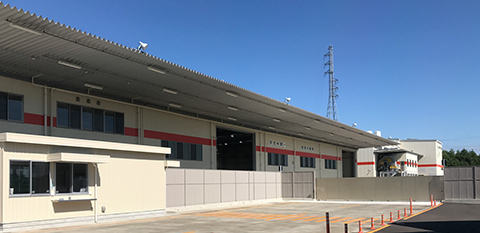 The Seki Factory,Matsuda Sangyo Co.,Ltd
The Seki Factory,Matsuda Sangyo Co.,Ltd
Appropriate disposal of waste
Property for which a lease has expired and cannot be reused are discarded. Going above and beyond simply complying with the Waste Disposal and Public Cleaning Law (Waste Management Act), as a waste generating business operator, we keep close track of every piece of waste we dispose of through an electronic manifest system. We conduct on-site inspections of waste disposal contractors according to an annual schedule.
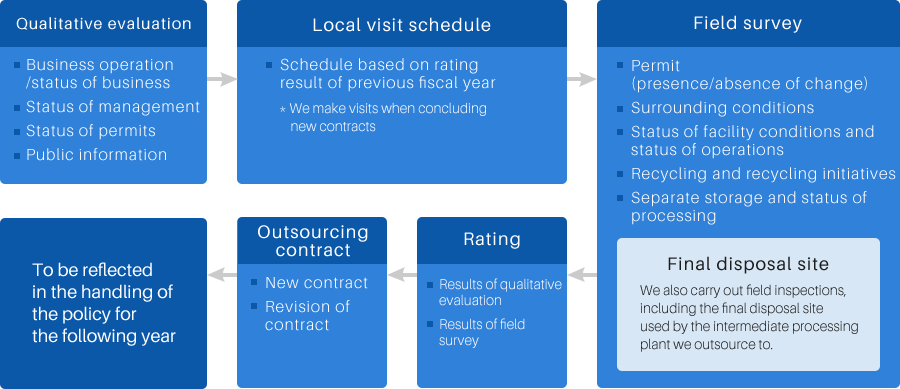 Management of outsourcers
Management of outsourcers
 Management of reports
Management of reports
Examples of intermediate processing plants
Waste is transported to an intermediate processing plant and is reduced in quantity and volume by processes such as crushing. As a result, a lot of waste is now being recycled at the intermediate processing plant.
KANAME KOGYO Co., Ltd.
Shikahama Recycling Center of KANAME KOGYO Co., Ltd. is an intermediate processing factory established in September 2000. It is responsible for crushing and recycling mixed waste generated in the Tokyo metropolitan area.
In 2002, it obtained ISO14001 certification, and in 2010 it acquired Industrial Waste Expert certification under Tokyo's excellent industrial waste processing company certification system. In 2011, it acquired certification as an Excellent Industrial Waste Processing Company.
In December 2017, it was listed on the Second Section of the Tokyo Stock Exchange. (Transferred to the Standard Market with the reorganization of market classifications in April 2022)
The company publishes a waste information magazine called the KANAME Environmental News for waste-generating business operators and carries out activities such as free business consultations and workshops. The company is working to expand the appropriate disposal of waste.
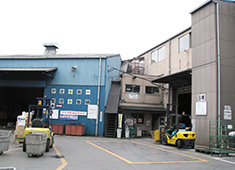
Shikahama Recycling Center,
KANAME KOGYO Co., Ltd.
Re-Tem Corporation
Tokyo Plant of Re-Tem Corporation, which was completed and started operations in 2005, is the newest plant, and is part of the Tokyo Super Eco Town being built in the Tokyo Bay area as part of Japan's urban renewal project. It recycles 100% of various wastes, mainly metal waste, discharged in the Tokyo metropolitan area.
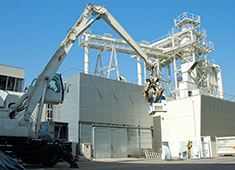
Tokyo Plant, Re-Tem Corporation
Example of final disposal site
The final disposal of waste is shifting to recycling processes due to the lack of final disposal sites for landfilling.
ECO KEIKAKU CO., LTD.
ECO KEIKAKU CO., LTD.'s Yorii Eco-Space and Arashiyama Eco-Space are the only private facilities certified by the Ministry of the Environment under the Act on Promotion of Development of Specified Facilities for the Disposal of Industrial Waste as comprehensive recycling facilities contributing to improved recycling rates.
Both facilities, which are capable of accepting waste items totaling over 20 different item types, are actively involved in developing new technologies such as material recycling, in order to meet various needs. The plants use mainly thermal recycling with a total processing capacity of 155.8 t a day.
Fuyo Lease periodically visits the company's disposal facility and disposal site to confirm the on-site conditions, to exchange information and to build relationships that can help both companies to improve environmental awareness.
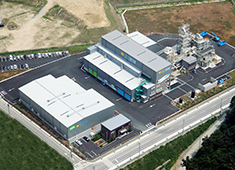
Yorii Eco Space,ECO KEIKAKU CO.,LTD

